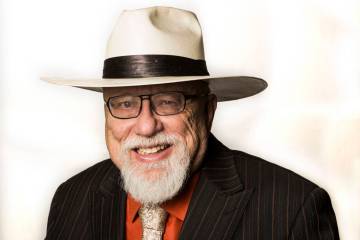A doper becomes a trucker
To pay for his heroin habit, James Allman kicked in the doors of Las Vegas Valley homes and stole cash and whatever he thought he could pawn.
That technique, which eventually sent Allman to the slammer for 33 months, was used by another burglar to make his money off my wife and I in September.
I couldn’t get that out of my mind as I talked with the 30-year-old Allman, who got out of High Desert State Prison last year and now works as a long-haul trucker.
“I’d knock on the door, and if nobody answered, I’d just kick in the door,” Allman said.
Allman was in Iowa the other day when I caught up with him on the phone. I had been introduced to him through the Foundation for an Independent Tomorrow, a Las Vegas nonprofit that helps ex-offenders through vocational training, job preparation and employment services.
Allman had stopped to unload a 40,000-pound shipment of food in Des Moines shortly after a snowstorm. Soon he’d go to a 12-step Alcoholics Anonymous meeting — something he looks for in every town where he stops for the night.
“I tell my story so people can see what can happen to them,” he said. “What I’ve done is terrible.”
Allman, who’s from a broken family, started using alcohol and marijuana at age 13. He was kicked out of school for a while in eighth grade for using weed, and he dropped out of Western High School as his drug use graduated to methamphetamine.
At 17, high on meth, he was arrested after waving a handgun at a woman to get her purse. A plea bargain allowed him to spend six months in jail on a conspiracy to commit robbery charge.
He almost died at age 22 when a friend stabbed him during an argument. He also barely survived two heroin overdoses.
Four years ago he was arrested on the burglary charge that sent him to prison. Because he used his own ID to pawn stolen items, police tracked him down.
“I hated prison — always being told what to do and watching my back so some gang member didn’t stab me,” he said.
The more we talked, the more I realized how fortunate Las Vegas is to have FIT reaching out to assist ex-offenders.
I’m the kind of guy who often finds it difficult to even give ex-cons the time of day, which isn’t too smart considering 95 percent of those who go to prison end up back in their hometowns.
But it’s hard to forget what some of them have done.
Using my background in crime reporting as a catalyst, I completed my master’s thesis in criminal justice on parents of murdered children. I learned firsthand there is no parole for those who’ve lost loved ones.
My concerns have focused on victims of crime. But I’ve increasingly realized how foolish it is not to help those who get out of prison.
After all, as FIT founder Janet Blumen points out, almost all of those who go to prison end up back in American communities. And without solid support after being locked up — research shows it costs a staggering $80 billion a year to incarcerate 2.4 million people — more than 60 percent of ex-offenders commit more crimes and end up back behind bars around three years after their release.
Blumen says less than 10 percent of ex-cons who go through FIT are recidivists. As impressive as that record is, keep in mind FIT has helped 4,200 people — not all of them ex-offenders — in 20 years.
There are now around 13,000 inmates in Nevada prisons, mostly from Las Vegas.
Allman, who broke his heroin habit in prison, said FIT and Freedom House, a nonprofit that provides housing, food assistance and recovery support services to homeless individuals, had much to do with him going straight.
Through FIT, he got the necessary training to become a truck driver, along with people, interview and internet skills.
“I got a chance, and I’m going to make the most of it,” Allman said.
Paul Harasim’s column runs Sunday, Tuesday and Friday in the Nevada section and Monday in the Health section. Contact him at pharasim@reviewjournal.com or 702-387-5273. Follow @paulharasim on Twitter.






















